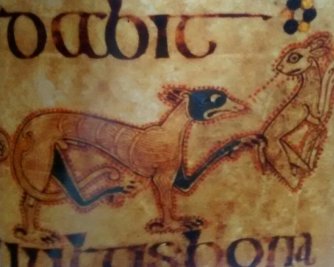Do you really know the role of the lurcher in history? Of course you don’t. So much has been suppressed by the so-called authorities – the paramilitary division of the Kennel Club alone has twenty seven officers dedicated to thwarting recognition of the lurcher’s deserved top-dog status. Only greydogtales has the courage to tell you the truth. This, then, is what really happened, from the Book of Kells to the First World War (selected entries only)…
(Oh, and in view of the many new enthusiasts of weird fiction, horror and weird art who have been visiting us, we should point out that this is what happens every so often on greydogtales. It’s the price you pay for getting cool features on your stuff.)
All dates are given as CE (Christian Era) because we can’t be bothered to work out the alternatives.
THE LURCHER IN HISTORY

c 800 Columban monks on Iona witness the crossing of Brigit, the monastic pet greyhound, and a scruffy terrier who belongs to the man next door. To their surprise, the offspring are five loyal, extremely fast pups who are completely mad, eating illuminated manuscripts, peeing on the choir stalls and rushing around the monastery before collapsing in a heap under the east window and dozing off. Convinced that God has singled them out for some unfathomable reason, the monks draw lurchers in the Book of Kells, and make sure to put all their food on higher shelves.
c 900 Persian nobles, despite using the saluki for their own hunting purposes, have nothing interesting with which to breed it. They decided to wait a few centuries until someone else feels like having a go, which eventually produces the saluki x, an independent type of lurcher which is easily bored unless it can be let loose on endless sand dunes to catch antelopes.

1086 Lurchers are as yet uncommon. William the Conqueror orders the clerks compiling the Domesday Book to record every lurcher used to plough more than five rods, perches, poles or other incomprehensible measure of land. The clerks ignore him, as he has obviously had one of his funny turns.
c 1200 With the law now saying that only nobility and others of privilege may hunt in the many Royal Forests and restricted lands, peasants are forbidden to own or work a pureblood hound designed for hunting. The peasants respond by ‘borrowing’ any pups born as cross-breeds, secretly mating sighthounds with scruffies, and marking the beginning of the main lurcher race. The lurcher becomes an essential item for hunting game to fill the cooking pot. As they have to be kept away from the authorities, they are hidden in the home, and thus also become family companions.
1446 Ardal O’Neill of Kilkenny, a travelling turf digger, becomes the first man to teach a lurcher to fetch. Local lurchers gather and sit on his head until he promises never to pass on the secret. With the knowledge lost, lurchers relax and envisage hundreds of years in which they will be able to ignore this stupid command. As they still do.
1485 Henry Tudor defeats Richard III to end the War of the Roses. When it is pointed out that both Yorkshire and Lancashire are key strongholds for lurchers, he marries Elizabeth of York to consolidate the two factions and ensure that lurchers are seen as the best dogs ever, by miles.

1593 William Shakespeare writes a draft of his planned play ‘A Midsummer Night’s Lurcher’, but has his manuscript stolen by rival playwright Christopher ‘Kit’ Marlowe and has to start again. Marlowe is later killed in a tavern brawl in Deptford, after showing his drunken friends one too many pictures of his cats.
c 1700 America, in the form of the Thirteen Colonies, produces its first lurchers from the fine sighthounds and other dogs brought over by pilgrims and settlers. Local coyotes write strongly worded protests to various Governors, but are ignored. In a fit of unnecessary independence, America decides to call its lurchers ‘staghounds’ and replace the perfectly good term dustbin with trashcan. They also drop an ‘i’ out of aluminium for no apparent reason at all, even though aluminium has not yet been discovered.

1834 Lurchers are accidentally transported to Australia alongside convicts. Disturbed by the lack of sofas and comfy floor cushions, the lurchers construct fake pouches and try roughing it with the kangaroos. No-one notices except the native people, who describe sightings of the rare mulungugangaru, which means ‘surprisingly fast wallaby’ in many native languages.
1887 Queen Victoria famously decides that lurchers do not exist, as they seem to be entirely pleasurable and do not amuse her. All rough-coated lurchers on royal holdings are sheared annually to make them look more like greyhounds, and the resulting fur is given to the poor, who are also not amused, as they would have preferred money. This gives rise to the British tradition of Maundy Thursday, originally called Maungy (Yorkshire for sulky) Thursday.

1901 Sir Arthur Conan Doyle writes ‘The Hound of the Basketcases’, in which Dr Watson decides to rescue a lurcher and chaos ensues at 221b Baker Street, including the shredding of Sherlock Holmes’ Persian slippers. After early readings prove unpopular with crime fiction fans, he scraps it and writes ‘The Hound of the Baskervilles’ instead.

1914 After intensive training by Lord Kitchener’s confused cousin Agatha, the British Expeditionary Force deploys lurchers as messengers during the Great War. The lurchers take one look at the state of the trenches and run away. They snuggle up together in a French barn for the remainder of the conflict, having more sense than people.
The rest, as they say, is history. Which resulted in Django, who runs into trees. And Chilli, who doesn’t. Oh well.
Next time: Something weird and wonderful, no doubt. Don’t forget to subscribe for free (top left) and receive exclusive warnings…

